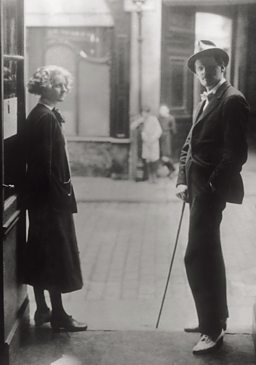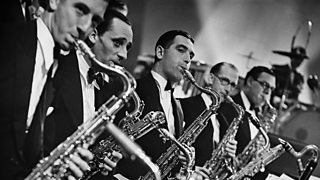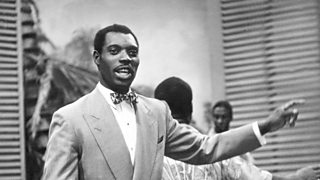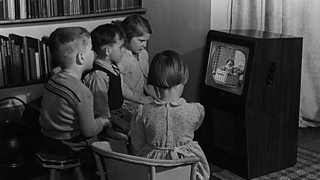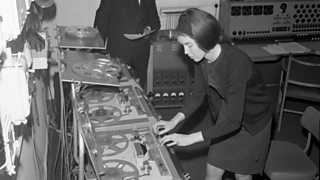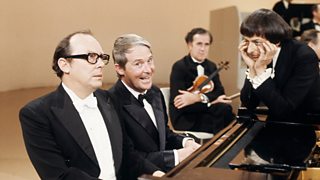The 1920s
The ����ý starts its first daily radio service in 1922, and we hear its iconic first words on the air.
The Roaring Twenties are soon in full swing, with music at their heart – we hear works by Walton, Ravel, Gershwin and Janáček intertwined with the words of James Joyce and King George V.
Soon, though, the century begins to take a darker turn with the General Strike of 1926 and the Wall Street Crash of 1929.
Listen on Radio 3 and ����ý Sounds
-
![]()
Radio 3's Soundscape of a Century
Press rewind on a century of the ����ý with an epic, eight-hour soundscape. Listen on ����ý Sounds now (UK only).
The music
Works that define the spirit of the 1920s
- George Gershwin: Rhapsody in Blue (1924)
- Jean Sibelius: Symphony No 7 (1924)
- Bohuslav Martinů: Kitchen Revue (1927)
- William Walton: Façade (1923) (performed by Edith Sitwell)
- Maurice Ravel: Piano Concerto in G (1932)
- Bessie Smith: Dixie Flyer Blues (1925)
- Leoš Janáček: Sinfonietta (1926)
- Gustav Holst: A Moorside Suite (1927)
- Alban Berg: Wozzeck (1925)
- Gabriel Fauré: Piano Trio in D minor (1923)
Events to listen out for
1922
November: The start of ����ý Radio
The British Broadcasting Company’s first daily radio service begins at 6pm on 14 November. The broadcast begins with the words: “This is 2LO calling” (2LO being the name of the ����ý’s transmitter). Announcer Arthur Burrows (who is also the ����ý’s Director of Programmes) then reads a news bulletin and a weather forecast twice: the first time fast, and the second time slowly, so that listeners can take notes. .
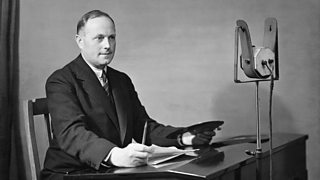
1924
January: The first radio play
By now occupying its own , the ����ý experiments with new entertainment formats. The company asks young playwright Richard Hughes to write “a play for effect by sound only, in the same way that film plays are written for effect by sight only”. His solution is to write a play set in a coal mine. A Comedy of Danger is broadcast live on 15 January, and the audience encouraged to listen in the dark.
February: The pips
For the first time, radio listeners hear the “pips”: six electronically generated beeps played on the hour, every hour, to indicate the time of day. Initially, the timing for the pips comes from a pair of precision clocks in the Royal Greenwich Observatory. Later, they will be controlled by an atomic clock located in the basement of ����ý Broadcasting House in London.
Given its reliability, radio (and later television) becomes the time standard for the country. .
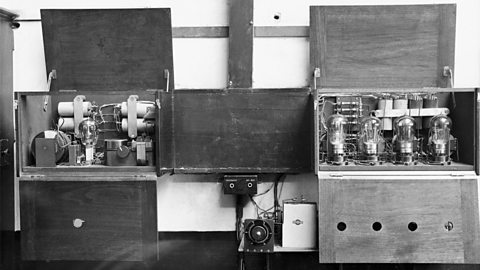
The pips
In February 1924, radio listeners hear the “pips” for the first time. Image © ����ý
April: The first radio broadcast by a British monarch
The Empire Exhibition of 1924 is held in London at the purpose-built Empire Stadium (later becoming Wembley Stadium). In broadcasting his opening speech, King George V becomes the first in a long line of British monarchs to address their people via radio. Events around the country are suspended so that the public can listen; an estimated ten million people hear the transmission.
November: An early audiobook
James Joyce is one of the first writers to record their own work in their own voice. He is reluctant to do so, but is persuaded into the studios of His Master’s Voice by his publisher Sylvia Beach, owner of the legendary English-language bookshop Shakespeare and Company, to record a passage from Ulysses.
1926
May: The General Strike
The 1926 General Strike sees some 1.7 million UK industrial workers strike for nine days over wages and working conditions.
Many newspapers stop printing during this time, leaving limited ways for the authorities to communicate with the public. Chancellor Winston Churchill is all for commandeering the British Broadcasting Company, but successfully argues that this would prevent the corporation from remaining independent and impartial. Find out more with ����ý 100.
1929
October: The Wall Street Crash
The crash of the London Stock Exchange in September is followed by a series of black days on Wall Street in October, when share prices on the New York Stock Exchange collapse. The prosperity and security of the “Roaring Twenties” has come to an abrupt end.
